Blount Surname Ancestry ResultsOur indexes 1000-1999 include entries for the spelling 'blount'. In the period you have requested, we have the following 496 records (displaying 41 to 50): Single Surname Subscription | | | Buying all 496 results of this search individually would cost £2,514.00. But you can have free access to all 496 records for a year, to view, to save and print, for £100. Save £2,414.00. More... |
These sample scans are from the original record. You will get scans of the full pages or articles where the surname you searched for has been found. Your web browser may prevent the sample windows from opening; in this case please change your browser settings to allow pop-up windows from this site. Inhabitants of Cambridge
(1298-1389)
'Cambridge Gild Records' was edited by Mary Bateson for the Cambridge Antiquarian Society, and printed in 1903. Several important records for the town are brought together: minutes of the Gild of St Mary in the church of St Mary in the Market Place, 1298-1319 (pages 1-13); bede rolls of the same of around 1349 (14-25); minutes of the Gild of Corpus Christi in the church of St Bene't (26-62); returns for all the Cambridge gilds in 1389 (63-128); a calendar of deeds connected with the gilds of St Mary and Corpus Christi (129-150); and also a subsidy roll for the borough, listing householders in the 8th year of king Edward II (1314-1315) (151-157). The gild minutes include lists of persons entering the gild, usually paying a certain amount for alms and for wax for lights (candles). The bede rolls list prayers for the souls of the deceased, using the formula 'pro anima ..... (et ..... uxoris ejus)', 'for the soul of ..... (and of ..... his wife)'. Dates are not generally given, but most of the entries in these bede rolls are from 1349 to 1352. BLOUNT. Cost: £4.00.  | Sample scan, click to enlarge

| Inhabitants of London
(1375-1399)
Letter Book H of the City of London contains enrolments of recognizances between inhabitants, particularly citizens, for sums of money lent or due; grants of pieces of land or property; and various records relating to the city administration.
BLOUNT. Cost: £4.00.  | Sample scan, click to enlarge

| Inhabitants of Cheshire and North Wales
(1390-1399)
The county of Cheshire had palatine status, being in some measure independent of the rest of England: moreover, from the Statute of Wales of 1284, after king Edward I's subjugation of North Wales, until the union of England and Wales in 1536 to 1543, much of the administration of North Wales (county Flint in particular) was directed from Chester. When the Chester Recognizance Rolls were moved from Chester to the Public Record Office, they were placed among the Welsh Records. These rolls, so called because they do include recognizances (of debts &c.) among their contents, are in fact the Chancery Rolls of the palatinate, containing enrolments of charters, letters patent, commissions and other documents issued under the seal of the palatinate. Deeds and other evidences of a private nature were also enrolled on them. A calendar of the Recognizance Rolls from their commencement to the end of the reign of Henry IV was prepared by Peter Turner and included in the 36th Annual Report of the Deputy Keeper of the Public Records in 1875. We have now indexed this, dividing the enrolments into decades. This is the period from the 13th year of king Richard II, who had intended to raise the earldom of Chester into a principality, to his overthrow by Henry IV.BLOUNT. Cost: £6.00.  | Sample scan, click to enlarge

| The English in France
(1413-1414)
King Henry V of England claimed the throne of France (and quartered the fleurs-de-lis of France with the lions of England on the royal standard) as had his predecessors since Edward III, as descendants of Philip IV of France. He married Katherine, youngest daughter of king Charles VI of France in 1420, and thereafter styled himself 'heir and regent of France'. The English had real power or influence in Brittany, Normandy, Flanders and Gascony, and actual possession of several coastal garrisons, in particular Calais, where the French inhabitants had been replaced by English. The English administration kept a series of records called the French Rolls. On these are recorded royal appointments and commissions in France; letters of protection and safe-conduct to soldiers, merchants, diplomats and pilgrims travelling to France from England and returning, and to foreign legations. There are also licences to merchants to export to the Continent, and to captains to transport pilgrims. This calendar of the French Roll for the 1st year of the reign of Henry V (21 March 1413 to 20 March 1414) was prepared by Alexander Charles Ewald and published in 1883.BLOUNT. Cost: £6.00.  | Sample scan, click to enlarge
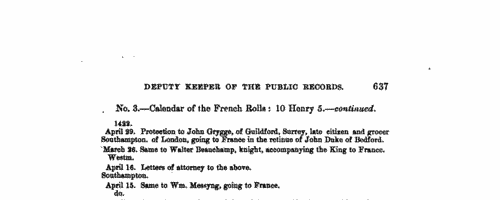
| Indults for Portable Altars: Diocese of Coventry and Lichfield
(1404-1415)
Individuals (laymen, monks or priests) could obtain indults or indulgences from the Pope to possess portable altars, enabling them to do their devotions in unconsecrated places. The fee was 10 groats for one person, 12 for two (frequently a husband and wife). Lists of these indults, headed De Altaris Portatilibus, were entered in the Lateran Regesta in the Vatican archives; from the reigns of popes Innocent VII to John XXIII (1404 to 1415) there are such lists in volumes CXIX, CXXXI, CLIX to CLXI, CLXV, CLXVII and CLXXXIV, from the first year of Innocent VII, the second year of Gregory XII, and the second to fifth years of John XXIII. Those relating to the British Isles were copied and translated by J. A. Twemlow, and printed under the direction of the Master of the Rolls in 1904. The diocese of Coventry and Lichfield included Staffordshire, Derbyshire, Cheshire, Lancashire south of the Ribble, and northern Shropshire and northern Warwickshire.BLOUNT. Cost: £4.00.  | Sample scan, click to enlarge
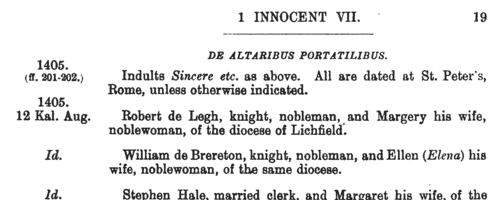
| The English in France
(1414-1415)
King Henry V of England claimed the throne of France (and quartered the fleurs-de-lis of France with the lions of England on the royal standard) as had his predecessors since Edward III, as descendants of Philip IV of France. He married Katherine, youngest daughter of king Charles VI of France in 1420, and thereafter styled himself 'heir and regent of France'. The English had real power or influence in Brittany, Normandy, Flanders and Gascony, and actual possession of several coastal garrisons, in particular Calais, where the French inhabitants had been replaced by English. The English administration kept a series of records called the French Rolls. On these are recorded royal appointments and commissions in France; letters of protection and safe-conduct to soldiers, merchants, diplomats and pilgrims travelling to France from England and returning, and to foreign legations. There are also licences to merchants to export to the Continent, and to captains to transport pilgrims. This calendar of the French Roll for the 2nd year of the reign of Henry V (21 March 1414 to 20 March 1415) was prepared by Alexander Charles Ewald and published in 1883.BLOUNT. Cost: £6.00.  | Sample scan, click to enlarge
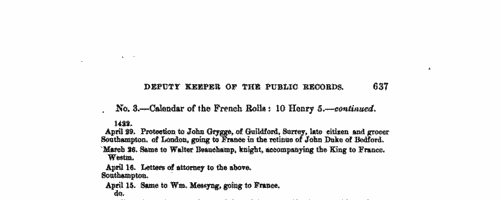
| Grantees of offices, commissions and pardons
(1413-1416)
The Patent Rolls are the Chancery enrolments of royal letters patent. Those for the 1st, 2nd and 3rd years of the reign of king Henry V (21 March 1413 to 20 March 1416) were edited for the Public Record Office by R. C. Fowler, and published in 1910. The main contents are royal commissions and grants; ratifications of ecclesiastical estates; writs of aid to royal servants and purveyors; and pardons. The commissions of the peace issued for the English towns and counties and entered on the rolls, being largely repetitive, have been consolidated in a single appendix.BLOUNT. Cost: £2.00.  | Sample scan, click to enlarge

| The English in France
(1415-1416)
King Henry V of England claimed the throne of France (and quartered the fleurs-de-lis of France with the lions of England on the royal standard) as had his predecessors since Edward III, as descendants of Philip IV of France. He married Katherine, youngest daughter of king Charles VI of France in 1420, and thereafter styled himself 'heir and regent of France'. The English had real power or influence in Brittany, Normandy, Flanders and Gascony, and actual possession of several coastal garrisons, in particular Calais, where the French inhabitants had been replaced by English. The English administration kept a series of records called the French Rolls. On these are recorded royal appointments and commissions in France; letters of protection and safe-conduct to soldiers, merchants, diplomats and pilgrims travelling to France from England and returning, and to foreign legations. There are also licences to merchants to export to the Continent, and to captains to transport pilgrims. This calendar of the French Roll for the 3rd year of the reign of Henry V (21 March 1415 to 20 March 1416) was prepared by Alexander Charles Ewald and published in 1883. The battle of Agincourt took place on 25 October 1415, so this roll has many letters of protection for soldiers, and various letters and orders relating to the ransoming of French prisoners.BLOUNT. Cost: £6.00.  | Sample scan, click to enlarge
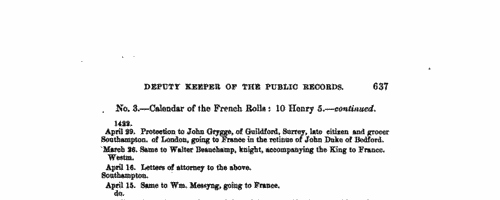
| Norman Rolls
(1200-1417)
The dukedom of Normandy is one of the appendages of the English crown, but actual possession of the dukedom was actively contested by the kings of France. During the periods of English power records were kept for Normandy similar to those of the royal administration in England, with enrolment of letters and grants of liberties and privileges and confirmations of previous enjoyed rights. The rolls for 1200 to 1205 and during the reassertion of English rule under Henry V in 1417, were edited by Thomas Duffus Hardy for the Commissioners of the Public Records, and published in 1835. Most of the persons mentioned are French inhabitants of Normandy or Englishmen in France, but there is also a long section (from page 122 onwards) of valuation of lands of Normans in England, where English jurors, county by English county, attest to acreage, numbers of cattle &c.BLOUNT. Cost: £4.00.  | Sample scan, click to enlarge

| The English in France
(1416-1417)
King Henry V of England claimed the throne of France (and quartered the fleurs-de-lis of France with the lions of England on the royal standard) as had his predecessors since Edward III, as descendants of Philip IV of France. He married Katherine, youngest daughter of king Charles VI of France in 1420, and thereafter styled himself 'heir and regent of France'. The English had real power or influence in Brittany, Normandy, Flanders and Gascony, and actual possession of several coastal garrisons, in particular Calais, where the French inhabitants had been replaced by English. The English administration kept a series of records called the French Rolls. On these are recorded royal appointments and commissions in France; letters of protection and safe-conduct to soldiers, merchants, diplomats and pilgrims travelling to France from England and returning, and to foreign legations. There are also licences to merchants to export to the Continent, and to captains to transport pilgrims. This calendar of the French Roll for the 4th year of the reign of Henry V (21 March 1416 to 20 March 1417) was prepared by Alexander Charles Ewald and published in 1883. BLOUNT. Cost: £6.00.  | Sample scan, click to enlarge
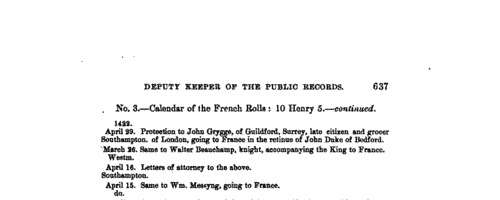
|
Research your ancestry, family history, genealogy and one-name study by direct access to original records and archives indexed by surname.
|












